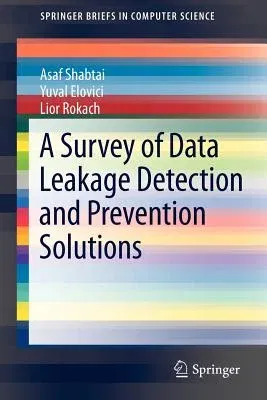SpringerBriefs present concise summaries of cutting-edge research and
practical applications across a wide spectrum of fields. Featuring
compact volumes of 50 to 100 pages (approximately 20,000- 40,000 words),
the series covers a range of content from professional to academic.
Briefs allow authors to present their ideas and readers to absorb them
with minimal time investment. As part of Springer's eBook collection,
SpringBriefs are published to millions of users worldwide.
Information/Data Leakage poses a serious threat to companies and
organizations, as the number of leakage incidents and the cost they
inflict continues to increase. Whether caused by malicious intent, or an
inadvertent mistake, data loss can diminish a company's brand, reduce
shareholder value, and damage the company's goodwill and reputation.
This book aims to provide a structural and comprehensive overview of the
practical solutions and current research in the DLP domain. This is the
first comprehensive book that is dedicated entirely to the field of data
leakage and covers all important challenges and techniques to mitigate
them. Its informative, factual pages will provide researchers, students
and practitioners in the industry with a comprehensive, yet concise and
convenient reference source to this fascinating field. We have grouped
existing solutions into different categories based on a described
taxonomy. The presented taxonomy characterizes DLP solutions according
to various aspects such as: leakage source, data state, leakage channel,
deployment scheme, preventive/detective approaches, and the action upon
leakage. In the commercial part we review solutions of the leading DLP
market players based on professional research reports and material
obtained from the websites of the vendors. In the academic part we
cluster the academic work according to the nature of the leakage and
protection into various categories. Finally, we describe main data
leakage scenarios and present for each scenario the most relevant and
applicable solution or approach that will mitigate and reduce the
likelihood and/or impact of the leakage scenario.


